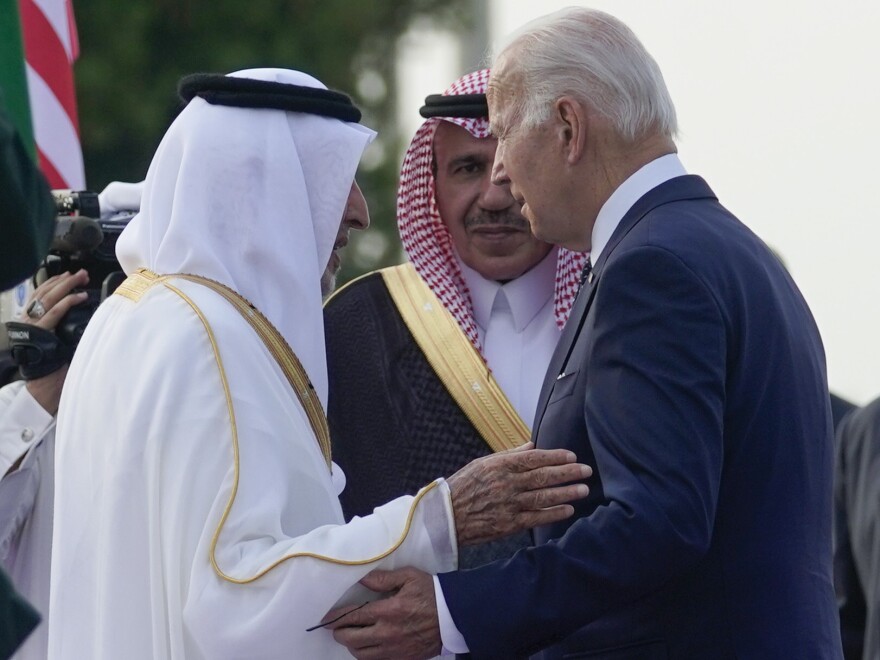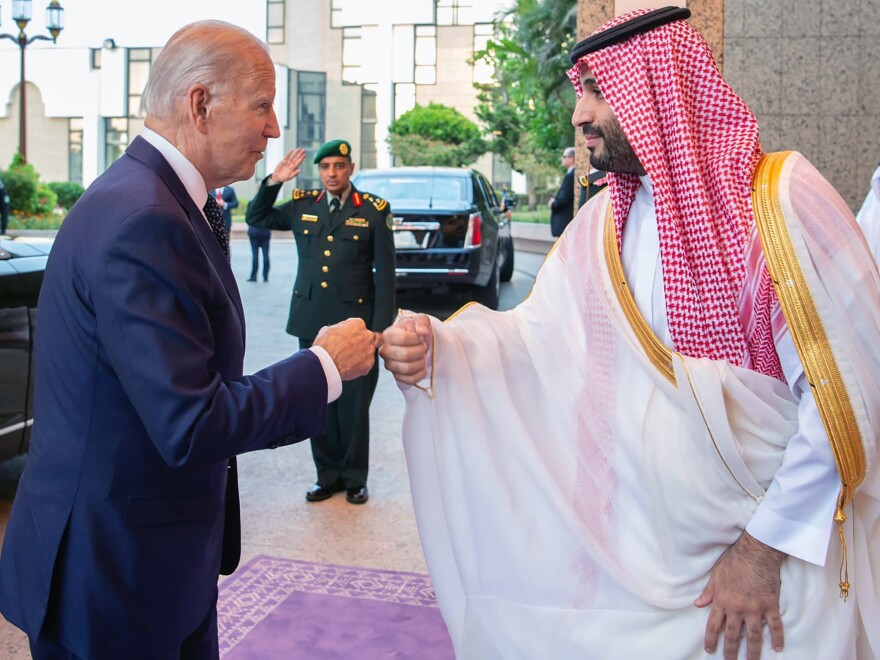In the end, President Biden went with a fist bump.
Biden greeted Saudi Arabia's Crown Prince Mohammad bin Salman with an outstretched closed fist when he arrived on Friday at Al-Salam Royal Palace for meetings with bin Salman and his father, Saudi Arabia's King Salman.
The greeting had been a question of intense speculation leading up to the controversial meeting in Saudi Arabia. When running for president, Biden had vowed to treat the country as a "pariah," due to a long string of human rights abuses, including the murder of Washington Post journalist Jamal Khashoggi – a killing in a Saudi operation that U.S. intelligence assessed had been approved by the crown prince.
HRH the Crown Prince receives the US President at Al-Salam Palace in Jeddah.
— SPAENG (@Spa_Eng) July 15, 2022
#SaudiUSSummit#SPAGOV pic.twitter.com/LuOVXbcsZj
Biden's greeting happened outside of the presence of U.S. media traveling with Biden. But the kingdom's state media captured video of the greeting, and the Saudi Arabian government was quick to distribute images of it across social media platforms.
Biden and bin Salman both spoke during the brief window that the press was allowed into their meeting, but reporters in the room were not able to hear either man's remarks. And unlike when Biden meets with foreign leaders in most other settings, television and radio reporters were not allowed to carry boom microphones into the meeting to better pick up the audio.
Biden fist bumps with Saudi Crown Prince Mohammed bin Salman as meetings get underway in Jeddah pic.twitter.com/jtdgUYmliD
— Kevin Liptak (@Kevinliptakcnn) July 15, 2022
The meeting came together as global oil supplies tightened and prices soared due to Russia's invasion of Ukraine. Biden announced a trip to Saudi Arabia, and the White House swapped out his early "pariah" pledge for the language of diplomatic realism.
Biden also framed his meetings in Israel and Saudi Arabia as part of a broader push for increased stability and peace in the Middle East region.
Still, it was clear the White House was defensive about the optics of Biden greeting and sitting down with the heads of a government he had dismissed during the campaign as "having very little redeeming value."
When White House officials announced that, due to the risk of COVID-19, Biden would limit handshakes during his Middle East trip, it was widely seen as an attempt to side-step what could have been an awkward and enduring image of Biden and bin Salman would shake hands.
At earlier stops in Tel Aviv, Jerusalem and Bethlehem, Biden frequently lapsed into hand-shakes.
On Thursday, Biden was pressed on whether he would raise Khashoggi's death during the meeting, but stopped short of saying he would do so. He said that he always brings up human rights, but said that his "position on Khashoggi is so clear — if anyone doesn't understand it in Saudi Arabia or anywhere else, then they haven't been around for a while."
Biden's national security adviser Jake Sullivan told reporters flying with Biden on Air Force One to Jeddah that the president does not preview the details of what he plans to raise in meetings — but would still push human rights. "You will see him speaking over the next day publicly on the issue of human rights, and he will of course also engage privately on the issue," Sullivan said.

After Friday's meetings with the Saudi king and crown prince, Biden will spend Saturday holding broader discussions with leaders from several Middle Eastern countries, including Iraq, the United Arab Emirates, Saudi Arabia, and Israel.
Copyright 2022 NPR. To see more, visit https://www.npr.org. 9(MDExNDI3NjUzMDEzNjkzMTgzNTExNDFlYQ004))







